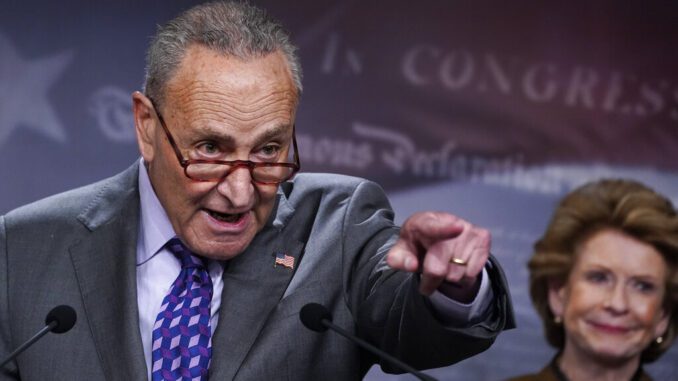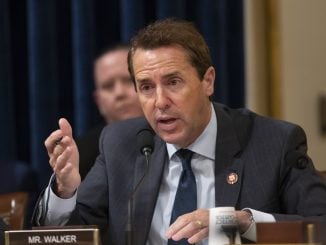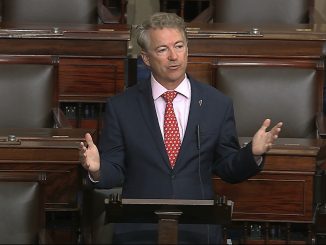
WASHINGTON, D.C. — Senate Minority Leader Mitch McConnell is warning that Democrats’ plans to curb drug prices would insert “socialist price controls” between Americans and the treatments they need as partisan battle lines form over a shrunken economic package that President Joe Biden wants Congress to complete within weeks.
“Bring it on,” No. 2 Senate Democratic leader Dick Durbin of Illinois told reporters in response Monday, underscoring his party’s hopes that the fight would buttress them in November’s congressional elections. “This prescription drug issue is an inflation issue. It’s a public health issue. It’s a cost to the government issue. And it’s something the American people get.”
Biden conceded last week he would settle for a far narrower economic plan than he’d sought at the beginning of his presidency. Capitulating to Sen. Joe Manchin, D-W.Va., Biden said he wanted Democrats to quickly write and pass a measure limiting pharmaceutical prices, extending expiring subsidies for people buying health insurance and modestly reducing federal deficits.
Manchin, one of his party’s most conservative members, a fossil fuel champion and an indispensable vote in the 50-50 Senate, announced last week that those were the only elements he was willing to include in the legislation. He cited concerns about inflation that’s risen rapidly this year. Manchin’s remarks meant Democrats’ hopes of including efforts to reverse climate change were at best a long shot this year.
“I haven’t walked away from anything,” the West Virginian told reporters Monday about monthslong talks over the party’s economic push, now seemingly on life support, with Senate Majority Leader Chuck Schumer, D-N.Y. He called inflation his “greatest concern” and added, “I don’t know what tomorrow brings.”
While Democrats largely seemed ready to accept the pared-down bill and claim an election-season achievement, Manchin’s performance is clearly wearing on many. His objections spiked most of Biden’s multitrillion-dollar aspirations to strengthen child care and other social programs and raise taxes on the rich, contributing to criticisms that Democrats have fallen short while controlling the White House and — narrowly — Congress.
“I think Joe should have made his position clear a hell of a long time ago,” Durbin said. “We’ve spent a lot of time, wasted a lot of time on negotiation.”
House Speaker Nancy Pelosi, D-Calif., told fellow Democrats in a letter that the Senate’s proposed health provisions “are essential, as we must act to reduce the cost of prescription drugs.” Said Sen. Elizabeth Warren, D-Mass.: “We have waited a year and a half for 50 votes. It’s time to move where we can move.”
The prescription drug measure negotiated by Schumer and Manchin would let Medicare negotiate prices for the pharmaceuticals it buys, require manufacturers to pay rebates for some price increases, clamp a $2,000 annual ceiling on Medicare recipients’ out-of-pocket drug costs and provide free vaccines for older people.
The nonpartisan Congressional Budget Office said the proposal would save the government $288 billion over the coming decade, chiefly because the government would pay less for pharmaceuticals. The extended health care subsidies would use some of that money, with the rest for deficit reduction.
McConnell said the proposal would punish an industry that delivered COVID-19 vaccines just two years ago, a remarkably rapid and effective achievement, and hurt patients.
“Washington Democrats are working right now, right now to find ways to put more bureaucracy between American patients and the treatments they rely on,” he said. “They want to put socialist price controls between American innovators and new cures for debilitating diseases.”
White House officials touted the benefits of shoring up subsidies for millions to purchase coverage under the Affordable Care Act and reducing the cost of prescription drugs. Both are longtime Democratic goals.
“We’re on the cusp of a very big win here” on health care, said White House press secretary Karine Jean-Pierre. She reiterated a pledge from Biden last week to take executive action if Congress fails to act on climate, but offered no specifics of what Biden might do.
Manchin has said he would consider climate change legislation in September once he’s seen updated inflation figures. Approving a measure in the heat of election campaigns would be extremely difficult. Republicans seem likely to win House control and have a realistic chance of capturing the Senate as well.
The Pharmaceutical Research and Manufacturers of America, known as PhRMA, the industry’s most influential lobbying group, said Democrats’ latest bill had gone “from bad to worse for patients.” Spokesperson Debra DeShong said the measure would “threaten patient access and future innovations.”
PhRMA said its member companies spent a record $102.3 billion on research and development last year.
Drugmakers on average spent a quarter of their net revenues on R&D in 2019, a far larger proportion than the semiconductor, technology hardware and software industries, the budget office said.




